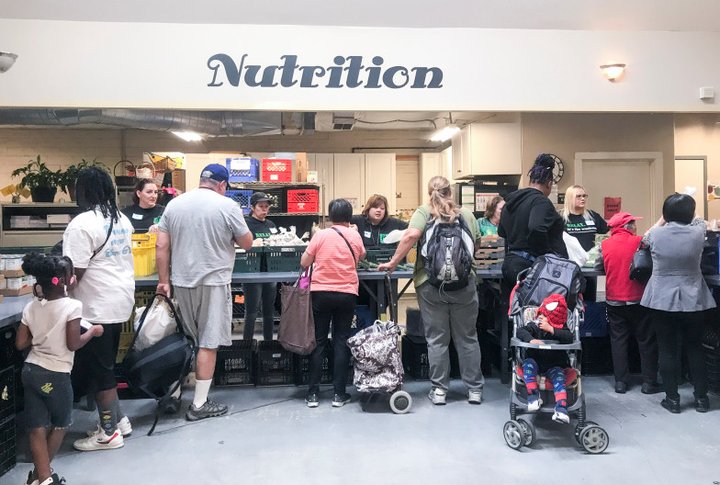
People pick up produce, canned goods, meat, dairy and bread at the River City Food Bank in Sacramento. Photo by Jackie Botts for CalMatters
###
The Trump administration finalized a rule Wednesday that will cut off food stamps to roughly 688,000 American adults.
The U.S. Agriculture Department said the move will save about $5.5 billion over five years. The rule takes effect in April 2020.
“This is about restoring the original intent of food stamps,” said Agriculture Secretary Sonny Perdue on a call to reporters. “Moving more able-bodied Americans to self-sufficiency.”
About 198,000 Californians stand to lose their assistance in buying food, according to a 2018 estimates by the Urban Institute.
Under current law, able-bodied adults without dependents working fewer than 80 hours a month or in certain training or volunteering activities qualify for three months of food stamps every three years. States and counties can waive those limits if, for example, unemployment rates are high.
Currently, all but six California counties — Alameda, Contra Costa, Marin, San Francisco, Santa Clara and San Mateo — have received waivers through August 31, 2020. Fresno has waived the limits for the past two decades.
The new rule will make it significantly harder for counties to drop the requirement. A city or county will need an unemployment rate of 6% or more, as well as approval from the governor, to qualify for a year-long exemption. Fresno had an unemployment rate of 5.8 percent in October.
“It will require almost every county to enforce the harsh time limit on providing nutrition assistance for adults who are working less than 20 hours each week, no matter how hard they are looking for a job, have irregular schedules, or are employed but unable to document their hours,” said Jessica Bartholow, policy advocate at the Western Center on Law and Poverty.
Fresno Department of Social Services Deputy Director Linda Du’Chene said the rule will harm the Central Valley’s farmworkers.
“We are a rural agricultural county, and we are very concerned about our clients who are working seasonal jobs. For example, it’s raining (Wednesday), so our farmworkers who may need those hours to qualify are not working,” Du’Chene said.
The county’s workload also will increase. Fresno will have to check monthly whether CalFresh recipients are meeting their eligibility requirements.
According to Bartholow, this will affect all able-bodied adults without dependents. The California Association of Food Banks estimates that could be as many as 700,000 Californians.
“Just because you don’t lose benefits doesn’t mean you’re not impacted. It means you now have to tell your boss you need a pay (stub) because you’re on food stamps. You have to spend the extra time and work to get your pay stub and send it in to the county,” Bartholow said.
The rule is the first of three Trump-era food stamp cuts to be finalized. Under all three rules, the Urban Institute estimates that roughly 3.7 million Americans would lose food stamps, including 625,700 Californians.
Congressman Jim Costa, a Democrat from Fresno, said the decision would harm thousands of residents in the San Joaquin Valley.
“I fought to maintain SNAP eligibility for those who need it most in negotiations for the 2018 Farm Bill, which the president agreed to and signed into law. Now the president is going back on his word,” he wrote in a press release.
State Senate President Pro Tempore Toni G. Atkins said in a news release the decision would “make it harder for adults on the brink of homelessness to get the food they need.”
###
Manuela Tobias is a journalist at The Fresno Bee. This article is part of The California Divide, a collaboration among newsrooms examining income inequity and economic survival in California.
CalMatters reporter Jackie Botts contributed to this story.
CALmatters.org is a nonprofit, nonpartisan media venture explaining California policies and politics.
CLICK TO MANAGE